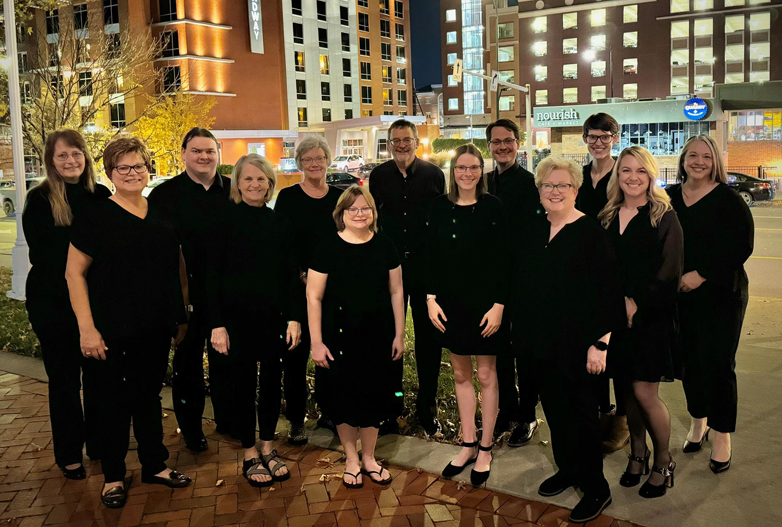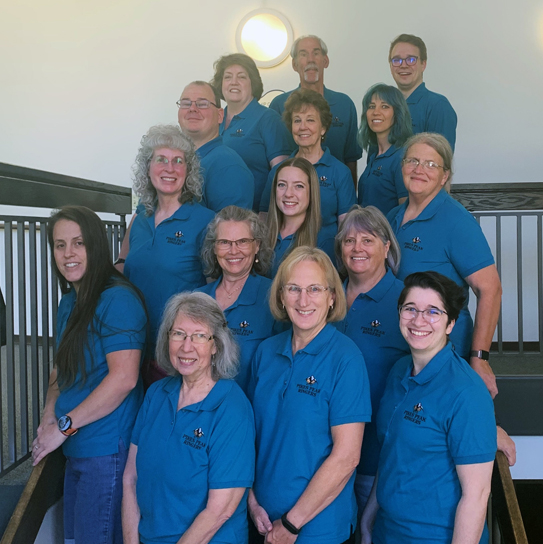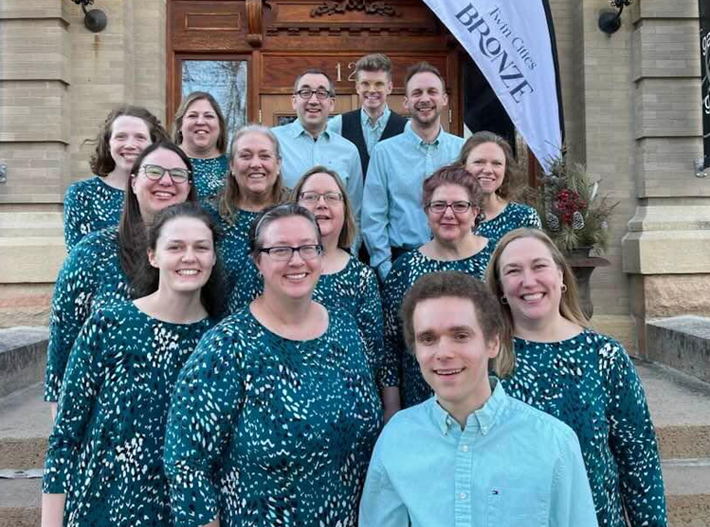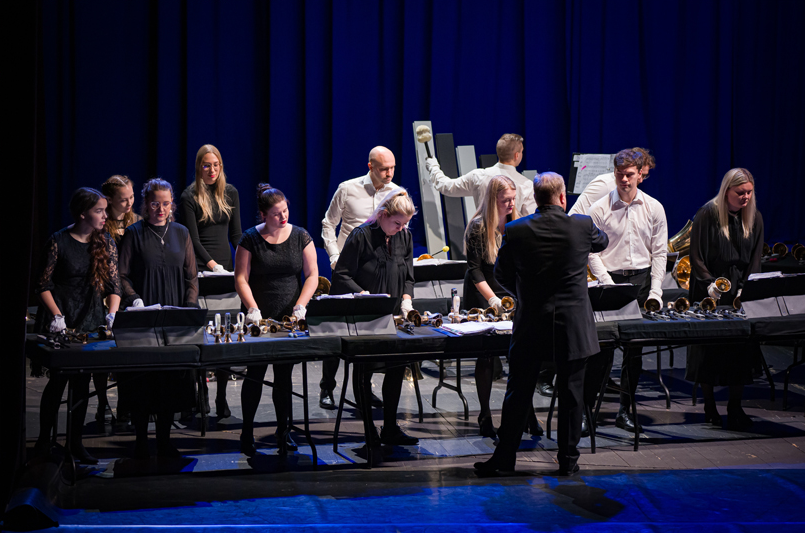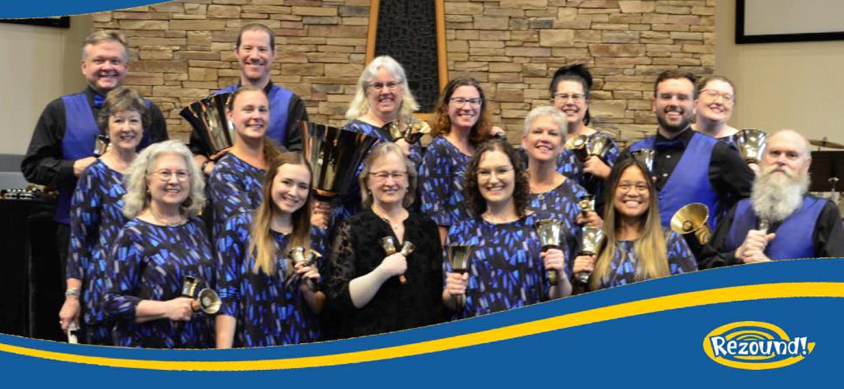SESSIONS & SHOWCASES
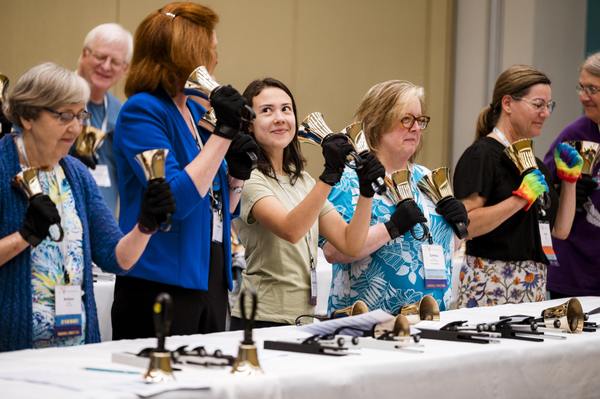
Classes are organized into several categories based on performing groups individual needs. Click the links below to jump to each class category. Class selection will begin in January.
You must pre-select your classes for the event. If you are registered, you may select your classes by CLICKING HERE.
Directors: If you are registering multiple people at one time, you may download and print THIS SHEET to use as a tool to help you have all information in front of you while registering. Print it and ask your attendees to fill it out and return it to you to make registering them easier.
Administration | Composing/Arranging | Concerts/Performances | Festivals/Clinicians
Handbell Group/Organizational Management | Health | Rehearsal and Performance
Religion/Worship | Solo/Ensemble | Techniques
Administration
Audio Recording and Audio for Livestreaming of Handbell Ensemble Performances
Bob Avant (Session 5)
Whether you are an experienced audio engineer, one who is dabbling in recording, or someone who just wants to know more about how to specifically record handbell ensembles in a concert or capture audio for a livestream, this session is for you. Capturing handbells presents a challenge as compared to other instruments. There are several variables and details to consider, including performance layouts, recording equipment, mic placement, performance venue issues, the recording engineer, and much more. This session provides a great deal of information on these and related topics that will enhance your recording and livestreaming efforts.
Website Creation & Maintenance Using Weebly (WYSIWYG-style)
Damien Lim (Sessions 1, 9)
Websites are an integral and very basic part of digital marketing. You could be charged a fee for a professionally designed and corporate-maintained website, or you could DIY your website for your group or yourself, and even manage it from your phone while on the move. Using Weebly is absolutely free and easy. Come with your laptop with WIFI connection for a quick DIY session, and create a baseline for your new website.
Building a Strong Volunteer-Based Program
Marci Corey (Sessions 2, 9)
Recruiting and retaining committed volunteers has always been a challenge faced by many music directors, but that challenge really increased in the post-Covid era. I have found that to be true in both my church music director role and my program manager role with the Girl Scouts and later with the Alzheimer’s Association. Despite the challenges, over the past 25 years, I have discovered several strategies and best practices that have allowed me to build strong volunteer-based programs and retain loyal and dedicated volunteers. In this class, I will share those strategies and best practices and also provide participants a chance to share challenges and best practices that they have encountered in their programs.
Setting Up and Using a Free Google Workspace Account for Your Organization
Marci Corey, Christian Warren-Corey (Sessions 3, 7)
Churches and other nonprofit organizations may qualify to set up a free Google Workspace account. We will share an overview of what products are available for your organization with Google Workspace. Then we will walk you through the process of applying for and completing the process of setting up the full Google Workspace suite of products for your church or nonprofit organization. Finally, we’ll share some practical real-world examples of how the Google Workspace suite of products can help support your organization and streamline the day-to-day functioning of your church or organization. We will also share how easy it is to collaborate with other staff members, board members, volunteers, and the general public using the Google Workspace suite of products.
The Leader’s Journey: Discovering Your Leadership Impact
Marie Loeffler (Sessions 4, 9)
Strong leaders can make a difference. It all starts with an awareness of our natural leadership style and then developing the necessary flexibility to adjust so we can achieve the best outcome. This interactive workshop contains self-assessments and exercises where participants discover their impact and explore leadership qualities, styles, and skills. Participants will discuss the strengths and challenges of the various leadership styles and develop an awareness of when to use each to become a powerful and effective leader with a positive impact.
Going Viral on TikTok
Mitchell Eithun (Sessions 5, 9)
“I hope they play Hot to Go!” How do handbells fit into social media trends? In this class I will share my experience producing viral handbell videos for online consumption – particularly on TikTok. Together we will think about how explore the community’s public image online and how engaging with pop culture can grow our reach in new and creative ways. What are our goals when we post about handbells? How can our online activities engage with new audiences and challenge our assumptions about who plays handbells? This class is applicable to anyone interested in promoting the art of handbells.
Next Level Fundraising Events
Paul Berryman (Sessions 1, 6)
It takes time and energy to put on a great show. There are times when you want to kick it up a notch and have a special performance with all the extras – food, drinks, bringing in new supporters, and raising funds through auctions and donations. It can seem like an overwhelming amount of work to successfully host a large event while still having a superb performance on stage. Using my experience as the event coordinator for the Houston Chamber Ringers’ “Chardonn-yay!” gala, I will show you how I planned the timeline, gathered resources, and organized volunteers to host our greatest handbell performance and fundraiser. I will share with you templates from my event planning that you can use to create your budget, schedule the event minute-by-minute, and promote to your fans.
Let’s Chat About A.I.
Paul Berryman (Sessions 4, 8)
Technology can be a great asset to any organization. AI can make your work better. For years, applications have been blank slates for us to create documents and graphics, manage data, and present ideas. Now AI is here to help us be more productive and efficient. It may seem creepy or a novelty, but the power of AI can suggest new ideas, help with repetitive tasks, and even adapt to your writing style and preferences. I’ll demonstrate ways to use AI to your benefit with Microsoft Copilot. Participants will be able to try out AI features in class.
Keep Your Data Safe and Secure
Paul Berryman (Sessions 2, 7)
Nonprofit organizations have become a popular target for hackers due to their collection of sensitive information, like financial and personal data, from donors. They often don’t have the budget to properly address cybersecurity and perceive themselves as low-risk due to the nature of their work. It only takes one person to fall for a clever phishing email to make a costly mistake. Fortunately, one of the greatest assets is knowledgeable members who know how to respond to social engineering threats like phishing emails. I share with you the basic steps you can take to prevent the most common attacks and to protect yourself and your organizations online.
Going Digital – Using Technology for Music in Handbells
Rick Holdsworth (Sessions 3, 4)
This class will cover HMA’s digital music policy and give ringers a demonstration of the technology that is available for using digital copies of music on an iPad or tablet and cover many of the “what ifs.” This class will give an overview of the technology, cover what equipment is needed, how to set up and use some of the basic features of the app, and, how to contact publishers for permissions. Prior knowledge and use of tablets/iPads for digital music is not required for this introduction/overview class.
Roundtable: Organizational Structure
Sharon Schmidt (Session 3)
There are a few essentials of organizational structure for a musical nonprofit, but many ways to arrange them. Whether you’re starting a group or revisiting your structure, join the discussion as we explore the pros and cons of the multiple options.
Streamlining Organizational Operations
Sharon Schmidt (Sessions 6, 8)
You have bells, musicians, and a rehearsal space! How can your organization streamline day-to-day operations? Whether you’re a nonprofit or for-profit organization, attending to a few items can improve your operations and allow you to spend more time making music. We’ll look at fiscal structure and accountability, insurance, technology (including digital storage and free/low-cost resources), and basic policies.
Composing/Arranging
The Art of Arranging Pop Music for Handbells
Nick Hanson (Sessions 2, 7)
This class will explore various ways to bring popular music to the handbell medium. The class will take time to analyze different songs, discuss what pop music would or would not work on handbells (and the reasons why/why not), and ways to incorporate techniques and other musical ideas to best translate the performer’s intentions. One point of clarification is that this is not a copyright class. The goal for this class is to specifically research and analyze reasons some music works well for handbells and steps to consider when making the arrangement.
Conquering Compositional Copyrights
Nick Hanson (Sessions 1, 5)
This class is proposed to participants who have wondered how to start the journey of receiving permission to arrange copyrighted music for handbells. Topics to explore will include simple scenarios like seeking permission from handbell publishers for small edits and changes up to tracking down ownership for songs from favorite artists, shows and movies, and performances. Some part of this class will also explore the concept of self-publishing, either as a sole entrepreneur or through an online service like Arrangeme.com.
Concerts/Performances
Handbell Show/Production Programming
Damien Lim (Sessions 3, 4)
Do you wish to produce a handbell concert or a handbell show/production? You might have seen the Ministry of Bellz (Singapore) on social media or YouTube. Come, listen to how a multi-disciplinary handbell show is produced: from the conceptualization stage to the preparation of its technical (lights, sound, projection, effects) and artistic components (visuals, music, dance, drama, and show host), right down to the rehearsal schedule and even marketing and presentation strategies. You might even get a chance to design your own show during class time too. This handbell show concept is: Tried-Tested-Proven.
Traveling and Touring with Handbells
David Harris (Sessions 5, 7)
What are the unique aspects of touring with your handbell ensemble that you should consider? Where will we go? How will we pay for it? How do we publicize it? How will we travel? What about health and safety concerns? In this discussion-oriented class, we’ll do our best to answer these and other questions that might come up.
Concert Creation
Elizabeth Mays Loebig (Sessions 1, 8)
Handbell concerts are wonderful events and a great way for handbell musicians to showcase their skills. But how does one go about creating a handbell concert experience? This class will look at the different elements to consider when planning a concert. It will also review examples of concerts given by various handbell ensembles to help brainstorm ideas that work for individual ensembles.
Program with a Purpose: Crafting Engaging Repertoire for Your Audience
Emily Li (Sessions 2, 9)
An insightful workshop focused on the art of repertoire selection for handbell ensembles. Participants will learn how to choose music that not only showcases the strengths of their group but also resonates with their audience. The workshop will cover key concepts such as thematic programming, creating a cohesive musical narrative, and selecting pieces that fit various performance contexts, all while considering the amount of rehearsal time available for the program. Special attention will be given to the unique characteristics of each ensemble, ensuring that the repertoire is appropriate and engaging for all participants. Attendees will engage in discussions and hands-on activities designed to enhance their understanding of how repertoire influences engagement and emotional impact.
Beyond the Church – Expand Your Handbell Performances
Nancy Youngman (Sessions 3, 7)
Have you wanted to step out of the box of handbell performances in churches, with the focus on handbell lovers? Or, would you like to reach out and expose our wonderful art to a wider audience? We will explore ways to approach performances in interesting venues, maybe even with those who have not been exposed to handbells. We’ll also explore ideas on how to present a concert of handbell music with other musical groups and in venues that may not even know what handbells are. A concert of handbell music at a rock and roll venue? Sure! A worship service for an international convention? Why not? Handbells with community choirs, bands, and orchestras? Perfect! All of these are attainable, but it does take some imagination and behind the scenes work. This class will give ideas on contacts, promotion, and incorporation of ways to get the idea of handbells only in churches out into your communities.
The Rainbow Connection (The Human Experience)
Matthew Compton (Session 7) Full
What does it mean to connect to the music? To our congregations and audiences? The people ringing with us? Explore many ways to enhance your musical performance and playing through an in-depth look at musical nuance, memorization, and the responsibility we have as musicians to create a musical and emotional connection with everyone we encounter and how to achieve that. Be prepared to explore and discuss the ins and outs of the emotional and mental human experience within handbells and how to create that “rainbow connection” with everyone we play with and for.
In Tune with Your Talk: Taking the Fear Out of Public Speaking
Marie Loeffler (Sessions 1, 2) 2-session class; both required
This interactive course is designed for musicians and presenters who need to narrate concerts or pitch funding proposals with clarity and confidence. The first section focuses on mastering public speaking essentials – pace, structure, body language, and vocal inflections – with the goal of transforming nervousness into a polished, engaging delivery. In the second section, participants continue to develop these skills through personalized feedback and evaluation, providing a safe space to refine their presentations with constructive support. Join us to learn the tools and mindset shifts needed to successfully connect with your audience.
Festivals/Clinicians
The Care and Feeding of Your Handbell Clinician
Brenda Austin (Sessions 4, 8)
You’ve hired a clinician for your handbell festival. What’s next? Leading a festival can be exhausting and anxiety-provoking for the planners and the clinician. The more you can eliminate worry and stress for everyone, the better your clinician and your festival will be. Let’s talk about how to best work with your clinician to have a great festival.
Roundtable: Signing Your Life Away – A Chat on Clinicians, Commissions, and Contracts
Michael J. Glasgow (Session 5)
When you compare the handbell community to other paraprofessional arts demographics, we’re a pretty small crowd, which is wonderful because it fosters an atmosphere of camaraderie and connection among handbell musicians. The downside, however, is that we can become a bit too casual when it comes to doing business. Because contracts can feel cold or sterile (and be intimidating), many of our clinician engagements and commission agreements have been through casual phone calls, texts, and e-mails. To be fair, that usually turns out okay, but the coronavirus pandemic caused widespread cancellations and postponements, and made a lot of folks wish they had had contracts. As the handbell world advances professionally, more and more clients and event organizers are negotiating contracts with composers, conductors, and clinicians. While this moderated and gently guided roundtable isn’t a substitute for legal advice, participants will be encouraged to get serious about discussing the ups and downs of contracts, retainers, and cancellations (for event leadership as well as commissioned pieces) to optimize that all-important element on both sides of the equation: communication.
Handbell Group/Organizational Management
Starting and Sustaining a Community Handbell Program
David Harris (Sessions 1, 6)
In this session, we’ll explore not only how to get off on the right foot with your new community group, but also how to keep it going year after year. We’ll look closely at how to continue to make your organization vibrant and appealing for both audiences and ringing members alike.
Why We Gather: Reframing the Community Music Ensemble
Kathryn Jurado (Sessions 1, 5)
“Have you ever really thought about what is a community music ensemble? Yes, it’s a group of people that play music and in this case, handbells, but what does it really mean? In this class, participants will be presented with research findings on the topic of “Community Music” and be challenged to reframe their thinking as to what it means to be a community handbell ensemble or community music ensemble of any kind, what roles they serve, for what purpose (social impact, musical impact etc.) and how to engage more people in community music-making.
You Have How Many Directors? Management and Implementation of the Community Handbell Ensemble with Multiple Directors
Kathryn Jurado and William J. Murphy (Session 7)
Many community music ensembles have a single Artistic Director or possibly have an Associate Director, but there is another option – multiple directors. There are pros and cons to this set-up, but it is certainly a viable option and allows for directors to continue honing their ringing skills. It also allows ringers the opportunity to improve their directing skills. Magic of Bronze is one such ensemble that uses multiple directors. Led by two of those directors, join us to learn how we make it work, along with the pros and cons of following this model in our community handbell ensemble.
Ensuring Harmony: Resolving Conflict and Creating Positive Change
Marie Loeffler (Sessions 6, 7)
The seeds of conflict invade our days in subtle ways and build up over time to create resentment and frustration, which can damage relationships, increase stress levels, and create a “culture of conflict” that negatively affects everyone. This interactive class defines conflict, the seeds of conflict, and why it is inescapable. There will be a conflict management style assessment to identify various characteristics taken on during moments of conflict and identify how to overcome them. As we fully explore the seeds of conflict and what contributes to continuing the struggle, we will uncover the five keys for managing the conflict and a simple tool to turn disagreements into positive outcomes.
Handbell Auditions
David Harris (Sessions 3, 8)
Is your group ready to determine its membership by auditioning? Are you curious about how other groups conduct auditions? Our class will explore why you might join a community group, audition mechanics for directors, ringer preparation for auditions, and how you integrate into a group once passing auditions.
Health
Ring ‘Til You’re 100! Ergonomics and Handbells
Mary (Libbie) Randels (Sessions 2, 3)
The oldest ringer in the instructor’s ensemble is 92 years old, while the youngest is 60. The class begins with warm-ups, followed by instruction on how to ring without straining any part of the body. Topics include Seat, Strike, and Stance, as well as additional strokes commonly found in modern music. The class also covers the physics of the bell and its sound. All these elements culminate in ringing actual pieces. This class is ideal for ringers of all experience levels and offers valuable insights for both new and experienced directors.
Ringing and Singing with People Living with Dementia
Marci Corey (Sessions 4, 8)
People who ring in or direct handbell ensembles understand the joy of ringing handbells with others. It can elevate your mood, provide a sense of connection with others, help you learn new skills, and improve critical thinking skills. All of these things can also be beneficial to people living with dementia. People living with the disease often have trouble with depression or agitation and they also find themselves feeling isolated and disconnected from others. There are currently an estimated 6.9 million Americans living with dementia and this number is on the rise. The need for easily accessible and appropriate music programs in assisted living centers, memory care units, adult day centers, and other facilities is critical. The activities presented in this session will be deliverable by anyone with a basic understanding of ringing handchimes and a willingness to encourage others to get involved in fun and uplifting ringing and singing activities.
Rehearsal and Performance
Ringer’s Rehearsal Techniques
Beth Judd (Sessions 2, 7) Session 7 Full
This class, designed for ringers and directors alike, will enable ringers to maximize their time in rehearsal. Tips will include effective score marking, analysis skills, effective use of downtime in a rehearsal, and much more. Participants will review a composition to reinforce those skills learned in the class.
The Handbell Rehearsal: Inside the Process and Best Practices
Billy Brandt (Sessions 5, 9)
As directors, and ringers, it is easy for our focus to be on our culminating performances. However, the work that we do in every rehearsal will directly impact the confidence and musicality our ensemble arrives at the performance having. Advancing our ensemble requires us to look specifically at how we use our limited rehearsal time to get the most out of our ringing experiences. In this session, participants will consider their own rehearsal strategies and attitudes before examining best practices on warmups, setting clear goals, and long-term planning.
Stage Presence and Why It Matters
Hillary Marotta (Session 6)
The public performance is the culmination of all that a handbell choir has learned. This class teaches the importance of and attention to details that allow performances to truly stand out and communicate the unspoken messages and musicianship of the art of handbell ringing. From the way we as ringers and conductors get on stage through the final note of the last piece, this class covers all of the ways we communicate with our audiences and achieve the level of professional musicianship.
Roundtable: Managing Performance Anxiety
Nikki Evans (Session 9)
Performance anxiety. Everyone has it, at least a little bit. What do we do with it? How can we use it to our advantage?
Handbell Artistry for Beginners
Michael Joy (Sessions 5, 6)
Handbell “artistry” can be an ambiguous concept. Some may describe it as a by-product of many years of practice, performance, and perfecting one’s skill. Or maybe it’s something that happens collectively in an auditioned, advanced ensemble. But as beautiful as our instrument is, its potential for musicality is wholly dependent upon the ringer’s ability to move it artistically through space. Anyone at any ringing level can begin to learn how to move with intentionality, precision, and expressive energy. Participants will discover their personal movement preferences that help or hinder their musical growth, experience “Bound Flow” and how it creates precision in ringing, and explore and encourage the use of expressive rather than functional energy in music making. Missed notes will feel less discouraging in the learning process when music embodiment becomes the goal. If you are new to ringing, either with or without other musical experience, or if you are a handbell director looking for fresh ideas for teaching beginners, this class is for you.
Ear Training for Handbell Musicians
Ron Mallory (Sessions 2, 6)
Just by listening, can you tell whether a piece of music is in a major or minor key, or what the time signature is? When you look at a piece of sheet music, can you hear in your head what it will sound like? Some basic ear training techniques can help you learn to do both of these things and more. We’ll also explore how these skills can contribute to your becoming a more fully-rounded handbell musician and ensemble member, as well as deepen your overall ability to appreciate and enjoy any music to which you listen.
Audition Skills for Ringers
Sharon Schmidt (Session 7)
Are you eager to join a community or college group? Auditions can be new and scary territory for ringers. We’ll step through the entire process from signing up to dealing with the results.
First Look: Strategies for Sight-Reading Success
Stevie Berryman (Sessions 3, 4)
First contact with new music doesn’t have to be a minefield. In this class, ringers will learn multiple strategies for sight-reading music, and directors will learn methods for introducing new music in ways that set their ringers up for success. Anyone can learn strategies for successful sight-reading.
Score Scanning Success
Anne Kelley (Sessions 5, 8)
This class will help directors and aspiring directors quickly navigating a handbell score to select repertoire for your ensemble and promote sight-reading success in one minute or less. After attending this class, you’ll be able to identify the trickiest parts of a score in seconds to help you select repertoire, figure out the difficulty, plan ringing assignments, and prepare for sight reading success. Whether you’re new to ringing, a director, or an advanced ringer, this will be a great review to help navigate handbell scores. Geared at directors or ringers who want to direct, this class will help make any piece of music accessible for your group.
Lifting Them Up
Elizabeth Mays Loebig (Sessions 2, 6)
Building confidence in ringers is a key component for effective musicianship. This class will provide specific and effective rehearsal strategies to build confidence in all ringers, regardless of age or skill level. This includes repertoire selection, rehearsal preparation, recovery skills, and making effective musical corrections.
Religion/Worship
Handbell Performance and Christian Worship
Mitchell Eithun (Sessions 4, 6)
Are church handbell musicians “performers”? Is playing at church a “performance”? In this class, we will explore theological perspectives on the nature of handbell music in worship to better define our roles as church musicians. Drawing from Scripture, tradition, and contemporary theology we will explore rich connections between creation, human vocation, and Christian ministry. Opportunities will be given to personal and collective reflection. This class is aimed at ringers and directors in faith-based handbell ensembles.
Handbells in Contemporary Worship
Ron Mallory (Sessions 3, 4)
Contemporary worship styles have become standard in many churches, and there’s no reason handbell musicians can’t participate – though it might involve thinking a bit differently about how we approach our instrument. Come explore some creative ways to use a full handbell choir, small ensemble, or soloist in a contemporary worship setting. We’ll also discuss ways to have healthy conversations with your pastor or worship leader about casting a vision for incorporating handbells into contemporary worship.
Solo/Ensemble
Foundations of Ensemble Ringing
Forté Handbell Quartet (Sessions 4, 7)
This foundational handbell ensemble class introduces ringers to the small ensemble setting, covering the application of general handbell techniques to the ensemble space, coordination considerations within a small ensemble, and differences in notation within published music. Other topics within the class include reading, interpreting, and marking music effectively; applying weaving to tricky passages, passing bells to yourself or your neighbor, spatial awareness considerations to enhance teamwork and precision, and using 4-in-hand ringing to smooth out musical lines. Throughout the class, hands-on exercises and practical examples will solidify these skills, helping to build the ringers’ confidence. By the end, participants will be equipped with the technical and collaborative skills to perform as part of a handbell ensemble, bringing musical pieces to life with teamwork, clarity, and expression.
Advanced Ensemble Ringing and Adapting
Forté Handbell Quartet (Sessions 5, 8)
This advanced handbell ensemble class builds on the fundamentals established in the Foundations of Ensemble Ringing class, so while the class is not technically a prerequisite, an understanding of ensemble notation, weaving, basic 4-in-hand, and some experience with ensemble ringing are expected. Throughout this class, we will delve into more intricate examples and music, introducing additional tools to the ensemble toolkit like traveling 4-in-hand, less-common aspects of 4-in-hand related to ensemble ringing, and 6-in-hand. We will also explore other sources of music not specifically written for small handbell ensembles, what attributes to look for that adapt well for small ensembles, and do some problem-solving with more complex passages of music. The hands-on exercises and practical examples will solidify the newly-introduced skills, and by the end of class, participants will be equipped with even more skills to elevate their handbell ensemble.
Bell Tree and Handbell Choir
Karen Van Wert (Sessions 3, 9)
Since their inception, Bell Trees have been a show stopper adding dimension and intrigue to concerts and performances. Louise Frier developed the BT concept to involve more people by combining handbells and chimes at the table with Bell Trees as a processional element. Composers continue to grow the repertoire available for this genre and build on the foundational concept of BT and handbell choir. I will take you on a journey of bell tree and handbell choir music hoping you will find inspiration to include BT in your next performance.
Techniques
Rethinking Rhythms
Anne Kelley (Sessions 1, 2) Session 1 Full
Do sixteenth-note rhythms stress you out? Is syncopation hard for you to ring? Then this is the class for you! Rhythms are easy and advanced rhythms like syncopation and sixteenth notes should be a breeze! There are many different ways to practice and play rhythms. This class will give an insight on different rhythm methodologies to help you rethink basic and advanced rhythms. Whether you’re a new or advanced ringer, you might pick up on some tips and tricks to help you successfully play and say all types of rhythms.
Mallets in Motion
Jack Burdwood (Sessions 2, 5)
Handbells are a percussion instrument and need to be approached as such, especially when played with mallets. This class covers proper mallet technique through the methodology of stick control as used by orchestral percussionists. Participants will learn the most effective way to hold mallets, where to strike the bell, and how the participant’s physical motions create different sounds on the bells. The malleting skills discussed will be taught through exercises that the participants can take home with them to practice, with the idea that malleting skills are developed over time through practice and repetition. The class will also draw attention to the visual aspect of handbell performances. Just as it is important to have all ringers ringing at the same height, it is also important to match stick height and, when appropriate sticking patterns across the ensemble.
Basic Percussion Methods
Jack Burdwood (Sessions 4, 8)
How do I play the tambourine? What’s a vibraslap? Why can’t I play the triangle with a screwdriver? All these questions and more are answered in this crash course for all things percussion. This hands-on class covers the techniques, do’s and don’ts for a variety of percussion instruments commonly used in handbell repertoire.
Beginning Bass Bells
Justin Wooten (Sessions 1, 5)
This class is aimed at ringers who are just getting started in bass bells. Improve, refine, and shape the basic skills of ringing in the bass and low bass. We will cover various subjects such as hand protection, ringing techniques, damping, weaving, and much more. We will be up, moving, and ringing, so be sure to put your ringing shoes on.
Advanced Bass Bells
Justin Wooten (Sessions 2, 6)
This class is for bass bell ringers who have experience in the bass/low bass but are looking to take their ringing to the next level. We will explore various advanced techniques, some of which have been around for decades, and some that are brand new. We will approach this class as if it were a bronze-level rehearsal so bring your A-game, some clothes you can move in and a positive attitude.
These Are Difficult Times: Pushing Beyond Common Time
Kathryn Jurado and William J. Murphy (Sessions 8, 9) – 2-session class; both required
“It was the best of times, it was the worst of times…” Is the paradoxical feeling of mixed meter for many ringers and even directors. It often distinguishes the intermediate ringer from the advanced ringer. In these two sessions, we will break down tricky meters and rhythms in a systematic, step-by-step approach to help directors and ringers to teach and master difficult rhythms in difficult time signatures. We will start with basic rhythmic reading as a whole group, then divide the rhythms by assigning certain beats or rhythms to different people in the room – basically going from composite, whole group rhythms to individually assigned beats and rhythms which start moving us towards handbell assignments. The first session will focus on the rhythm reading with voice, hand, and body, to audiation (inner hearing) and bells/chimes. The second session will then move towards playing these rhythms on bells and then pulling excerpts from pieces like Jason Krug’s Novus and Brenda Austin’s Vivace that have 6/8, 7/8, 8/8 meters, and more.
All About That Bass – Digging Deeper
Leslie Lewis (Sessions 7, 9)
In this class, we will dig deeper into the realm of possibility by looking at when and how to double down so we can use the expanded sets of bells and chimes with the golden oldies in our libraries. We will also take a closer look at assigning the bass bells (many of the philosophies apply to the entire range of bells). Participants should bring bass mallets with them.
Weaving Made Easy
Mary (Libbie) Randels (Sessions 1, 6)
Weaving is a must with most music. Stance, form, and bell grasp are essential. There are many ways to weave: the traditional, the pass the bell, and a knock method. All of this is simple once you learn the basics. We will work on all aspects until it is EASY.
Six-in-Hand Methods
Nikki Evans (Sessions 3, 8)
This class is for treble bell hogs and soloists. Learn a variety of six-in-hand techniques, and applications for each one.
Pinnacle attendees are not required to participate in a ringing track; however, those who choose to do so must attend all sessions of their selected track. Music must be purchased and learned in advance of the event. Participants will be informed of positions in advance and must bring their own music, pair of mallets, singing bell dowel, gloves, split-back music binder, music riser (if desired), and pencils. When registering, please select all three sessions of the chosen track.
Intermediate Ringing Track (Sessions 2, 6, 7)
Christine Chan, Conductor
Intermediate Ringing Track is for more experienced ringers to learn handbell techniques and improve musicality, challenge themselves, and practice new skills. The repertoire for the Intermediate Ringing Track is:
Aglow, Jason W. Krug / Grassy Meadow Music / GMH350013 / L3
Kyrie, Cathy Moklebust / Choristers Guild / CGB480 / L3
The Prayer, Joey Raney / Hope Publishing / HP2628 / L3
Canticle of Praise, Arnold B. Sherman / AGEHR Publishing / AG35288 / L4-
Advanced Ringing Track (Sessions 1, 5, 9) Full
Matthew Compton, Conductor
Advanced Ringing Track is for highly experienced ringers. Participants will read and refine pieces that incorporate various styles and musical challenges. The theme for this year’s Advanced Ringing Track is “Rhythms of the Heart” and the repertoire is:
Flora, arr. Yasuhiro Otsuka (Lv. 3+) – Seibunsha International – MSI082
Reunited, Alex Guebert – (Lv. 4) – Hope Publishing – HP3076
Transitions of the Heart, Matthew Compton (Lv. 3) – Evergreen Music – EGM107
Outburst, Karen Lakey Buckwalter (Lv. 5) – Beckenhorst Press – BEHB715
Pop/Rock Music Track (Sessions 3, 4, 8)
Nick Hanson and Brian Seemann, Conductors
This ringing track provides participants with the opportunity to ring/perform music specifically in the pop/rock genre. While ultimately performance-based, this class will also cover the unique ways to approach pop/rock music that are not equal to how musicians would approach other music found in the greater handbell repertoire. Participants can expect in-the-moment feedback for learning new music, collaborative experiences between each other and the instructors, and likely opportunities to get out of their ringing comfort zone. Even if participants go back to their home ensembles unable and/or unlikely to ring this music again, the skills learned and ways to approach this music will benefit them.
Careless Whisper, WHAM; arr. Nicholas A. Hanson (Lv. 3-) – Not for sale (but under 8-Bit Handbell label), will be provided for free at Pinnacle
Defying Gravity, Stephen Schwartz; arr. Brian Seemann (Lv. 3+) – 8-Bit Handbell Publishing – 8BHB-0050
Die With a Smile, Lady Gaga and Bruno Mars; arr. Nicholas A. Hanson (L3+) – 8-Bit Handbell Publishing – 8BHB-0051
For Good, Stephen Schwartz; arr. Sandra Eithun (Lv 3+) – Hope Publishing – HP3072
Ordering information for the Pop/Rock track will be available soon.
Columbia Handbell Ensemble, Columbia, Missouri
Wednesday, July 9 • 6:00 – 7:00 PM CDT
Click for Livestream
Forté Handbell Quartet, Colorado Springs, Colorado
Thursday, July 10 • 10:15 – 11:00 AM CDT
Click for Livestream
Pikes Peak Ringers, Colorado Springs, Colorado
Thursday, July 10 • 2:00 – 2:45 PM CDT
Click for Livestream
Embellish Handbells, Grand Rapids, Michigan
Thursday, July 10 • 6:00 – 7:00 PM CDT
Click for Livestream
Emily Li, Burlington, Ontario
Friday, July 11 • 10:15 – 11:00 AM CDT
Click for Livestream
Twin Cities Bronze, Minneapolis/St. Paul, Minnesota
Friday, July 11 • 3:00 – 3:45 PM CDT
Click for Livestream
Arsis Handbell Ensemble, Tallinn, Estonia
Friday, July 11 • 6:00 – 7:00 PM CDT
Click for Livestream
Rezound! Handbell Ensemble, Blue Springs, Missouri
Saturday, July 12 • 10:15 – 11:00 AM CDT
Click for Livestream
Distinctly Teen
Saturday, July 12 • 2:45 – 3:30 PM CDT
Click for Livestream
Concordia University Irvine Handbells, Irvine, California
Saturday, July 12 • 6:00 – 7:00 PM CDT
Click for Livestream
Several of our Exhibiting Partners will present showcases featuring reading sessions and product demonstrations.
Thursday, July 10
Session 1, 8:30 AM – 9:45 AM
Vreana and Michael J. Glasgow: What the Music Means to Me (Michael J. Glasgow) and A New Generation of Secular Repertoire (Vreana) (Trail Rooms)
Michael Glasgow returns for the second installment of What the Music Means to Me, a unique opportunity to hear directly from the composer some of the stories behind the origins of several of his works (entirely new repertoire from last year), as well as “where are they now?” glimpses into the journeys some of his pieces have taken. Join us to share in the funny, moving, sweet stories that afford an intimate look into the muse of this creative composer and arranger. Then, if you’re looking for music selections for an advanced community choir, or your church choir is ready to present a concert of secular and pop-style pieces, Vreana Independent Publishers can help you find what you need. We’ll have a blast ringing through pieces written by the next generation of handbell composers on the second half of this showcase! Works will typically range from 3 to 7 octaves, level 3 and up.
Witte Travel & Tours: “We’ll be in Scotland afore they!” (Birch Room)
Will we take the high road or the low road? Find out. Join Keith Cole to hear about next year’s pre-International Symposium tour of Scotland.
Session 2, 11:30 AM – 12:45 PM
Jeffers Handbell Supply: New Music and All-Time Favorites from 50 Years of Jeffers Handbell Supply
Join Jeffers Handbell Supply and editor/composer/arranger Kevin McChesney as we ring through some of our newest music along with a few handbell classics in honor of 50 years of Jeffers Handbell Supply. It’s our anniversary, but you’ll get the prizes!
Session 3, 3:15 PM – 4:30 PM
Malmark Bells, Inc. and Alfred Handbell: Creative Music-making with Malmark and Alfred Handbell
Hyosang Park and Kathryn Jurado, presenters
Join Hyosang Park and Kathryn Jurado as you explore exciting new releases from Alfred that feature a variety of instruments from Malmark Bells, Inc.
Friday, July 11
Session 4, 8:30 AM – 9:45 AM
J.W. Pepper & Son, Inc.: J.W. Pepper Presents Editors’ Choice Selections
Join Linda Lorgus for an engaging showcase highlighting new Editors’ Choice handbell music. This session will feature a curated collection of outstanding pieces that represent the diverse range and artistry of handbell repertoire, offering something for ensembles of all levels. Participants will have the opportunity to sight-read through these exemplary works, gaining inspiration for their own programming. Additionally, the session will include a discussion on the significance of Editors’ Choice in the handbell community, exploring how it serves as a valuable resource for directors and ringers, streamlines music selection, and promotes the growth of the art form. Don’t miss this chance to experience and celebrate the best in handbell music!
Session 5, 11:30 AM – 12:45 PM
Grassy Meadow Music and AGEHR Publishing: New Music from Grassy Meadow Music and Great Choices from AGEHR Publishing (Trail Rooms)
Jason Krug and Brian Childers, presenters
Come ring through a few of the newest selections from Grassy Meadow Music! Whether handbell solo, duet, 8-bell or 12-bell ensemble, or full choir, there’s something for all handbell musicians! We’ll also ring through some of the great music from AGEHR Publishing, and participants will be able to choose 1 copy of their favorite title from the session to take with them! We look forward to seeing you there!
Truly Horrible Things: It’s All Fun and Games! (Handbell Commons)
Paul Berryman, presenter
Play some card games, including the new limited edition National Seminar expansion deck for Crimes Against Handbells. Share some laughs while you learn about products that can either elevate or decimate your rehearsals like our new Wheel of Handbell Hijinks!
Session 6, 4:15 PM – 5:40 PM
8-Bit Handbell and From the Top Music: What’s New in 2025
Selections from the Summer 2025 Catalog of New Releases
Saturday, July 12
Session 7, 8:30 AM – 9:45 AM
Hope Publishing and Schulmerich Bells: There’s Always Hope with Schulmerich
Come read through what is new at Hope Publishing and meet many of our fine handbell composers. Additionally, Greig Ashurst from Schulmerich will be introducing his new Mallet Technique manual. Read down some great tunes, and pick up some tools for your group’s malleting. Brenda Austin, Jason Krug, Sondra Tucker, Kurt Meyer, Greig Ashurst, Sandra Eithun, Mitchell Eithun, and Ron Mallory, presenters
Session 8, 11:30 AM – 12:45 PM
Choristers Guild: Showstoppers and More
Immerse yourself in recent Choristers Guild releases under the direction of Matthew Compton, Mitchell Eithun, Carol Lynn Mizell, and Cathy Moklebust. Discover new finds for community, church, and school venues. Join in the fun and be inspired!

